#means its probably an internal part problem from mishandling
Explore tagged Tumblr posts
Text
my sibling fucked up our dads 2ds so it wont boot !! i am going to explode !!!
#medusa rambles#im meant to hack said 2ds for our dad for his birthday. btw.#WHICH IS TODAY !#i sat down 30 minutes ago to hack it#and ahahah. haha. it doesnt fucking boot#and the Way It Doesnt Boot#means its probably an internal part problem from mishandling#WHY DO THEY DESTROY EVERY FUCKING ITEM THEY ARE GIVEN#GOD.#theyre so unbelievably selfish i genuinely#cannot fucking stand them sometimes#they better hope its just a part that needs reseating and not a damaged part#i cannot fucking. get a new part by tonight if its a damaged part#i try to put a lot of thought and care into my dads birthday gifts and it will be genuinely very upsetting if i cannot do this#i was trying to make this year like a care package type gift#and this was meant to be the fun part :(
2 notes
·
View notes
Text
this is a hard habit to get out of, so i think the way id like to do it is by simply bringing out character flaws into the problem
"but i dont really get how to make flawed characters" i was like that too! so heres what i do!
step 1: list out all of your characters traits. im gonna use one of my characters, allie. shes perceptive, serious mostly, chaotic, trusting, etc. making characters have good traits is easier then coming with bad traits i feel like.
step 2: think of how the character interacts with others. is it the best it can be? is it horrid beyond belief? understanding that can help too, even if you dont need it.
step 3: take that list of good traits to the extreme. every trait can be bad gvien the right situation. lets go back to allie! shes trusting? maybe she trusts too much, and gets herself or her friends in danger. chaotic? her wildness doesnt allow her to realize the damage shes causing. hell, even perceptive! she feels like she needs to keep a look out, causing some internal conflict.
step 4: how does this affect those relationships? maybe allie is growing distant and isolated from people, slowly realizing shes a danger. she blocks out people trying to help, who take it as an insult. she takes their help as an insult back, or maybe she doesnt want to worry them.
thats really what i do, but ill put other notes underneath the line lol
-a solution doesnt have to be "the solution"! a character can mishandle themselves and misinterpret what they need, causing them to be stupid!
-intense emotions will make you stupid! if your running from a murderer, you may do stupid things to try and survive!
-character backstory doesnt need to be brought up directly for there to be a fight. maybe someone jokingly starts saying stuff, another misinterprets and accuses, soon enough a fight breaks out. or maybe someone unknowingly makes fun of someones past/an event that happened to them (example: "how could anyone be so stupid to travel for that long just to die like that?" could piss off anyone from someone who would rather not like the dead to be mocked to another whos traveled for a while and is held up as "the best" despite having made mistakes).
-mental illness can and should come somewhat into play if a character has something. while allie is stable and shit, i can say that being neurodivergent has made me unable to understand others do. differences make you think differently! (ie: a gay person who experienced prejudice in their life probably will view the world differently then a straight ally whos not had that problem). "oh but what if i dont write it well?" doing research is always the most important part obviously, but i can give some ideas (note: im not all of these groups, i just have some experience with these things, please do your research when writing these). someone with autism may have a harder time understanding emotions of someone because they feel them differently ("why arent you crying? [insert tragic event] just happened!" "i-" "do you not care?!" "of course i fucking do, i cant tell you why im not crying because i-i just cant, i dont fucking know.") (alterantively: "why are you crying? its not a big deal." "shut the fuck up."). a neurotypical person may make the wrong assumption about someone whos neurodivergent due to built in ableism ("oh wow, you actually solved it!" "heh, what doubt could you have?" "well, i mean.." "what-oh. i see then. thats how you think."). stuff like that can add something.
-you dont need a fight to have characters drift. a fight could be the split, but it doesnt need to be. you dont need characters to immediately comfront each other, yuou can let them bottle it up and make it all so worse.
-a character doesnt need to lie for distrust to happen. all it really needs to be taken as a lie. (character a: "I SWEAR, I DIDN'T KNOW!" character b: "and here i swore to trust you. what other lies do you hide under your tongue?")
-a relationship can be broken for no good reason. a life logn friendship, ended over one out of control fight. they may wonder if they reconsider, but they could just not regret where they stood, even if their ideals change.
lmk if i got things wrong/should change stuff or if i should talk on other writing things lol
That post that's like "stop writing characters who talk like they're trying to get a good grade in therapy" really blew the door wide open for me about how common it's become for a character's emotional intelligence to not be taken into consideration when writing conflict. I remember the first time I went to therapy I had such a hard time even identifying what I was feeling, let alone had the language to explain it to someone else. Of course there are plenty of people who've never been to therapy a day in their life who are in tune to their emotions. But even they would have some trouble expressing themselves sometimes. You have to take into account there are plenty of people who are uncomfortable expressing themselves and people who think they're not allowed to feel certain ways. It also makes for more interesting conflict to have characters with different levels of understanding.
104K notes
·
View notes
Text
listen-and-reflect replied to your post:
Um, just wondering, why aren't you around much...
… I’d be curious to hear your thoughts on Arknights. I’ve paid no attention to it whatsoever, but if it impresses you, I’m curious.
To boil it down to its component elements, I’d describe Arknights as “urban fantasy catgirl tower defense gacha.” If any of those words viscerally disgust you, there’s probably not much I can do to convince you otherwise, but personally that was enough to intrigue me. And what I found when I tried it surprised me in a good way. Honestly I’ve been struggling for like a month for how to talk about this, but for the purposes of this post I’ll boil it down to three major elements: Aesthetics, Worldbuilding, and Gameplay.
First of all the Aesthetics. Might as well start with a picture or three:
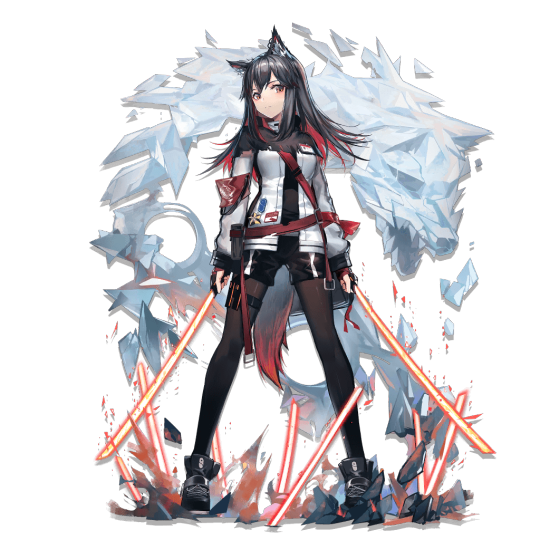
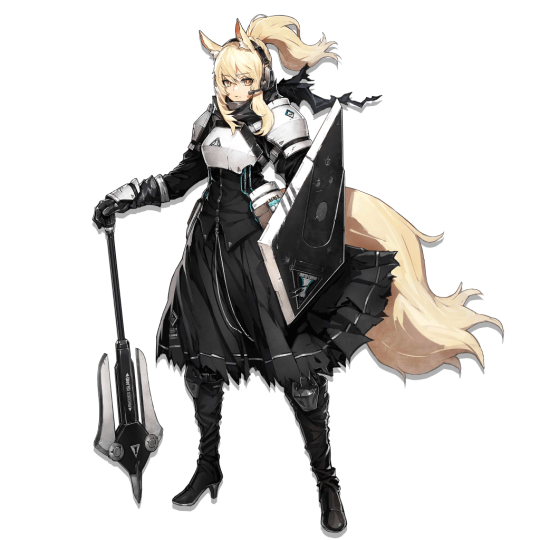
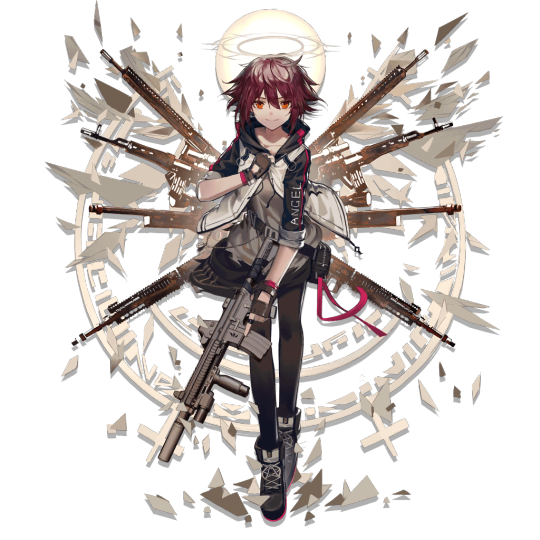
For the record, yes, 90% of the characters in this game are women, and there’s no explanation for that, that’s just how it is. I am 100% fine with that because I am a Touhou fan. Anyway, what I want to draw attention to is the way these women are portrayed. IE: they are posed/costumed to be seen as “cool” and while they certainly aren��t unattractive, it isn’t in a horny way that emphasizes their breasts or butts or anything. It’s not a perfect “practical clothing only,” I mean high heels aren’t great for fighting and there are other characters who show more skin, but the philosophy carries through in all the official art: these are cool, capable women who are never once reduced to sex objects for the male gaze. I respect that.
Also you don’t get to marry any of them which is a huge plus in my book.
It’s hard to say any more on that without moving on to the Worldbuilding. Basically, the world of Arknights is both blessed and cursed with a magical rock called Originium which is the source of all their problems. First of all it’s a miraculous power source, the resource that fuels the engine of modern society. Not only that but it can be used as a medium to cast actual magic spells (which is of course a well-studied phenomenon that’s treated as a science). On the other hand, its very presence warps the environment, causing large-scale city-destroying natural disasters on a regular basis. And more importantly for the conceit of the narrative, it can get in your blood, eventually causing an incurable disease called Oripathy which involves your body slowing turning into crystal from the inside out. Basically magic rock cancer. Later stages of it involve visible “crystal lesions” growing on the skin, but even internal growths can have serious medical problems. This is sometimes shown in character designs too:
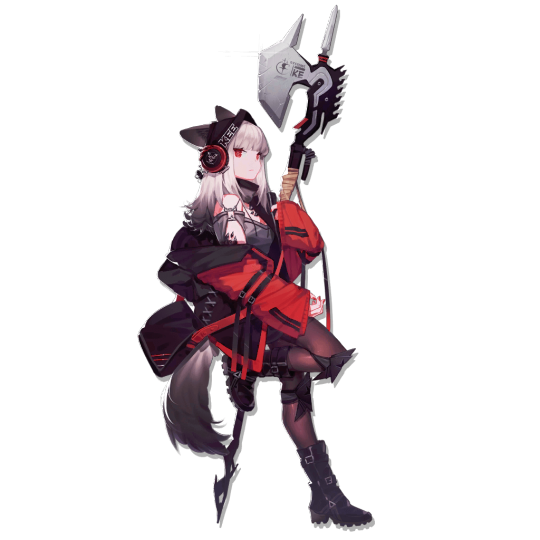
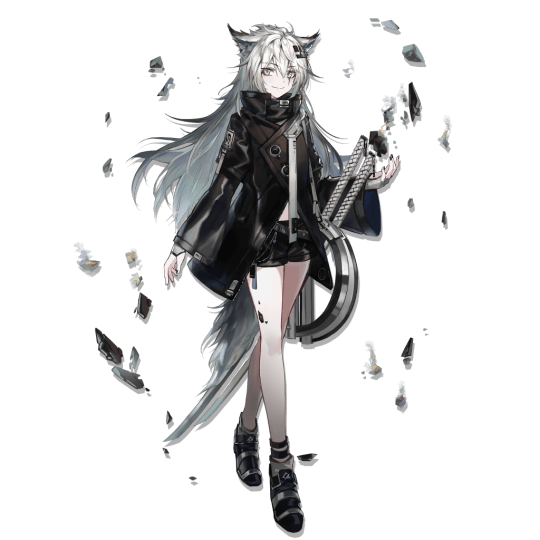
This is important to the worldbuilding because “The Infected” are a major source of discrimination and political unrest. Oripathy is only mildly contagious (you’re more likely to get it from mishandling the rocks directly), but the stigma of it is such that anyone with Oripathy is immediately quarantined, exiled, or worse. Both the player characters and their enemies are generally Infected, with the “good guys” (scare quotes intended) being a medical institute that takes in patients to treat the symptoms and vaguely hoping for a cure someday, while the “bad guys” are revolutionaries violently overthrowing the society that treats them as subhuman. There are analogies you could make to HIV, leprosy, or heck even current events with COVID-19.
Anyway, I say all this so I can turn to the in-game character profiles and how they’re structured. Specifically, they’re all medical reports written by the doctors of your institute (who are themselves playable characters who are Medics in-game):
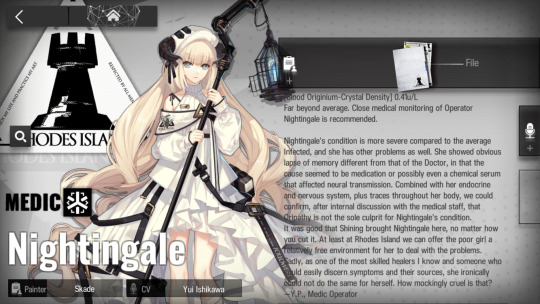
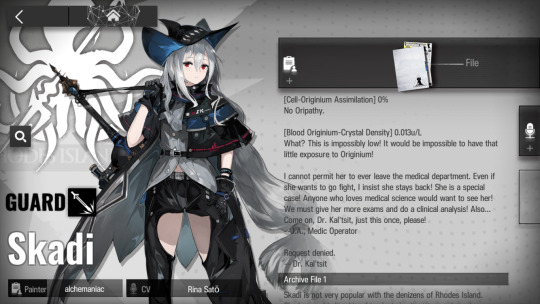
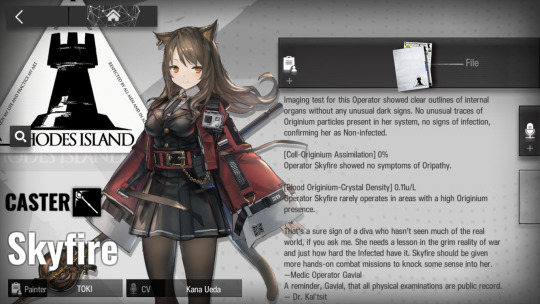
(Incidentally everyone uses codenames in this game). Anyway, my point is that these are not neutral, objective “word-of-god” profiles, these are the facts as they appear to some particular person in-universe. In Touhou terms, these are written by Akyuu: some clinical facts mixed in with rumors and speculation. And I absolutely love that.
More than that though, we get this amazing invention:
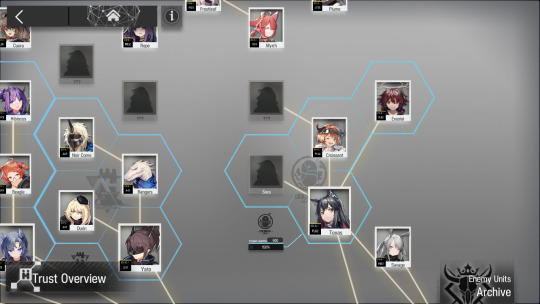
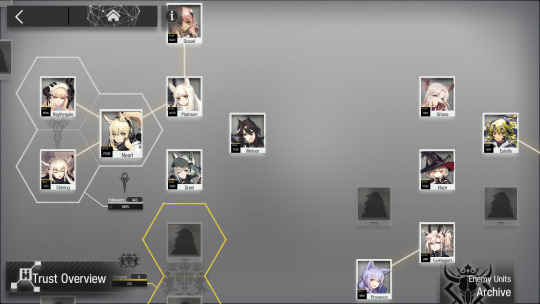
Why yes, that is an in-game chart of all the characters’ relationships, grouped by people who belong to the same organization, that fills in as you play. And yes, raising trust with characters by using them does fill in the names of people close to them who you haven’t met yet, as well as new connections to unknown people. Who is friends with Croissant?! I must know!
Er... Anyway, I think having this chart in-game is quite frankly a genius move on the part of the developers, since it gets you immediately invested in seeing how the characters are connected. But wait, there’s more! When you pull a dupe from the gacha, you get a little token that can be used to upgrade a character slightly, pretty normal. But even these little tokens have tiny bits of story on them!
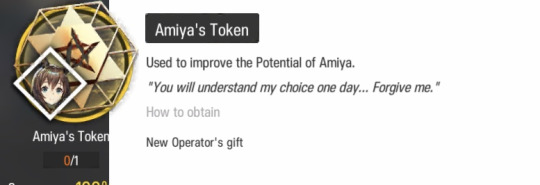



These are the items that are important to these characters, and they can change the way you see them. Every little thing in this game has story attached to it! It’s incredible! And they actually tell stories with these things. There’s one in particular that fascinates me (and others), but unfortunately I have exactly 0 of the characters involved so I’ll have to pull quotes from the wiki.
There are three characters from a faction called Rhine Lab: Ifirit, Saria, and Silence. The details are pretty vague, but basically Ifrit is an Infected child with incredible Originium channeling powers who’s been experimented on, and Saria and Silence are two doctors who were involved in those experiments but had a falling out after an experiment gone wrong. But how does the game tell you this? Well, lots of ways. Saria’s profile is the most explicit:
The relationship between Lady Saria and Rhine Lab is very complicated. Though all Rhine Lab Operators who work with Rhodes Island show some amount of respect for Lady Saria, Rhine Lab's Medic Operator, Silence, shows nothing but hatred for her. At the same time, Lady Saria appears unsurprised by Silence's feelings toward her. Whenever Lady Saria attempts to talk with Caster Operator Ifrit, Silence gets in the way. According to available information, the animosity between Saria and Silence stems from an experiment at Rhine Lab led by Silence. The experiment was an unfortunate failure. Lady Saria acted alone in suppressing the experimental materials that had gone out of control. Similarly, because of this experiment's mishaps, Lady Saria left Rhine Lab. It is not known why she chose to cooperate with Rhodes Island after leaving Rhine Lab.
But then you have Ifrit and Silence’s tokens:
A long novel telling a legendary story. It is badly burned and you can only barely make out the words.
A patterned feather decoration. This ineloquent researcher from Liberi shows her sincerity by gifting her own feathers.
But oh gee, guess who are wearing feather tokens in the designs? (it’s Ifrit and Saria)
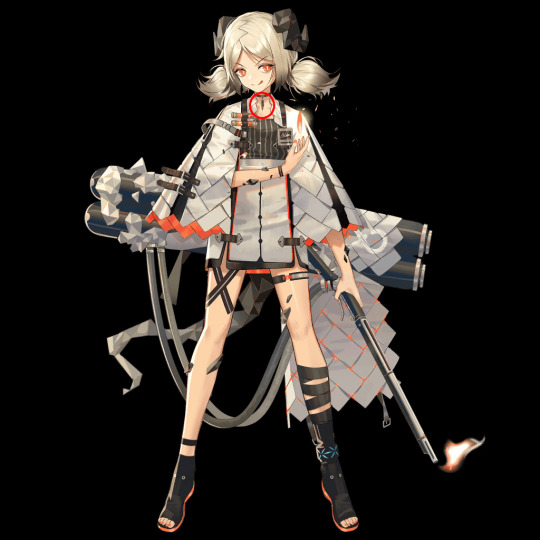
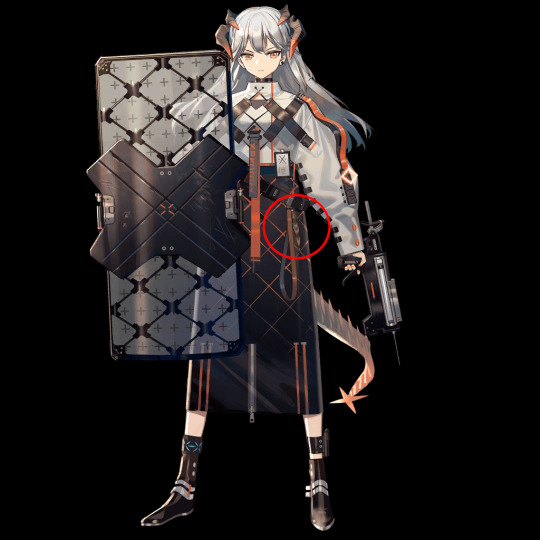
Also here’s Silence just so you aren’t left wondering what she looks like:

Anyway, the point is that the writers know how to throw tiny bits of characterization and hints of an untold story into literally everything in this game, and that is exactly what I live for.
Oh yeah, there’s also Gameplay.
Game’s pretty fun:
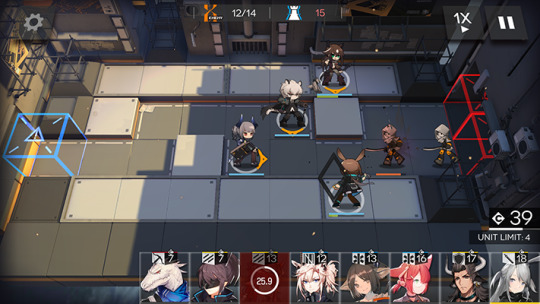
I enjoy it as a game too.
271 notes
·
View notes
Text
Clear and Present Danger (6/16)

Summary: Homicide detective Killian Jones has been searching for a way to bring Milah’s murderer to justice. There’s only one small problem: Robert Gold is the captain of the same homicide division. Enter Emma Swan, Internal Affairs investigator, looking into Gold’s shady dealings. Between the two of them, can they unravel the web of deals and lies that have gotten Gold to where he is?
Rated: T, for violence, some dark themes, angst, and whump (you expected different?
TW: character death, mention of past self-harm, fatal car accident, school hostage situation
Other ships: mentions past Millian in a good light, Outlaw Queen, Snowing
Art credit/link: The totally awesome @cocohook38 made the cover you can see above and on her blog here. Later in the story, she’s illustrated some key points to the fic and I can’t thank her enough for her work! Chapter Four’s art is HERE. Go show her some love!
Beta reader: @gusenitsaa took on this monster without probably knowing exactly what she was getting into (what do you mean 100,000 words?!) and any mistakes that you find are probably me being stubborn and ignoring her advice! Thank you!
A/N: Written as part of the 2018 Captain Swan Big Bang Challenge. You can catch up with all the other fics that are complete by following @captainswanbigbang and/or subscribing to the Group Collection on AO3 and/or the C2 on FFN. This is complete in 16 parts and will be posted every Sunday from now until its completion.
Take it away, It’s going to be a bumpy ride.
Word count: ~ 6,450 (100k Total in 16 chapters)
From the beginning: AO3 / FFN
Current Chapter: ao3 | ffn
CHAPTER SIX: OBSTRUCTION OF JUSTICE
Killian sighed for what seemed like the hundredth time that morning alone. He hadn't gotten much sleep the night before - after he'd docked the Jolly, Emma had bolted for her car so fast he couldn't even wish her a good night. He wasn't sure what he'd done wrong. He'd thought… well, he'd thought that maybe they were making progress. That maybe she was starting to trust him.
This morning was starting out spectacularly. Liam had left again, before the sun rose and before even Killian was out of bed - a note on the fridge just said "Cabin, Call You" - and had apparently taken the last of the coffee with him. The line at Dunkin Donuts had been ridiculous, some woman and her fourteen kids (he might have been exaggerating) had all ordered a full breakfast and, he'd swear, lunch as well.
Then, he'd gotten to work only to find that somehow, the greasy substance he was waiting for results on had been mishandled and destroyed. No one in the lab could explain how it had happened, but the evidence had been lost and there was nothing he could do about it.
Now they were stuck in traffic. Not the normal, pull your hair out because no one knew how to drive between the hours of seven and nine am kind of traffic. No, it was the slow, torturous crawl of bottlenecked accident traffic. According to the scanner, some idiot had stopped short in front of a tractor trailer, possibly for a small animal, and two lanes had been shut down completely as a result.
While he was glad he wasn't on that particular detail, Killian just wanted to get to Cambridge. He had a feeling that whatever Belle French could tell them, it would be worth the trip. If anyone knew LeGume and what he was into that got him killed, it would be the secret girlfriend.
"Bloody hell," Robin muttered under his breath as the car next to them merged and cut them off. His fingers clenched spasmodically around the wheel as if he were going to strangle it. "Don't they see we're in a police car?"
Killian huffed out an annoyed laugh in sympathy "It's unmarked, remember. And I don't think it's the steering wheel's fault, mate."
Robin cut his glare over to Killian and narrowed his eyes further. Killian resisted the urge to grab the wheel himself, knowing Locksley was capable of driving distracted but not wanting to make the evening news anyway.
Local homicide officers exacerbate accident. Story at eleven.
Finally, Robin gave up trying to wring the frustration out of the wheel and sat back with a resigned sigh. They weren't getting anywhere fast. "Did I tell you that Roland got a gold star for sharing yesterday?"
Killian grinned. "And you and Regina were worried that being an only child would stunt his growth," he teased jovially.
Robin rolled his eyes. "Says the man with a brother."
"You can borrow him any time you'd like," Killian said as seriously as he was able.
Robin cut a glance at him, clearly in disbelief.
"Oh, thank God," Killian muttered under his breath when they finally made it past the orange cones and could pick up speed again. Robin agreed by stepping harder on the accelerator and blowing by the soccer mom who had cut them off.
"So what did Roland share that earned him a gold star and, I'm sure, an ice cream cone?" Killian smirked as Robin grinned proudly.
"He shared his new markers with a girl at his art table. Let her use his green one, even."
Green was quite plainly Roland's favorite color. Killian knew this as well as he knew that his eyes were blue and Liam was his older brother. It was just the way it was.
Robin continued to fill Killian in on Roland's progress in kindergarten as they wound their way north to Cambridge. They finally turned down Ms. French's street and, surprisingly for the way the morning had gone, found a parking spot not too far away.
"Detectives?" Ms. French met them at the door, one hand holding it open while the other flipped up to check her watch. They were much later than Robin had told her they'd be there.
"Yes, ma'am," Robin acknowledged, showing her his badge and introducing both of them. "May we come in?"
She nodded, stepping back into the entryway to allow them access. "You said this is about Gaston? I haven't spoken with him in… well, nearly a week now."
Killian ignored the clenching in his heart that came every time he had to notify kin. "We're very sorry to tell you, ma'am, but Mr. LeGume was found dead earlier this week."
She blanched immediately, and the less cynical side of Killian whispered that there was no faking that. Whatever else she did or didn't tell them, Belle hadn't known that her lover was dead.
Robin took her arm gently when she swayed, her hand covering her mouth to stifle a cry of shock. He helped her towards the couch in the front room, lowering her gently to sit as Killian moved into the kitchen where he found a still-steaming cup of tea. He filled a glass with water from the tap anyway and brought both back to her.
"Ma'am," Killian called gently when he crouched down next to Robin. She looked up to smile blankly at him, and the empty look in her eyes was so familiar that he nearly had to turn away.
"Call me Belle, please," she allowed, taking the cup of tea from him and cradling it in her hands. "I'm not that old yet."
Killian nodded, placing the glass on a coaster made to look like an old first-edition book cover. Treasure Island, he read. The whole room was filled with books - some in floor to ceiling shelves and some scattered on the coffee and side tables. It was a miniature library and Killian got the feeling that it wasn't just for show. For one thing, the books were well cared for - but also well worn. There was no dust on the bookcases; she clearly took pride in each one.
"I don't know what I can tell you," she admitted. "Gaston and I… we talked about books. We went out up on the North Shore where we wouldn't be recognized. We didn't… he didn't talk about anything else."
Killian got the feeling that LeGume didn't do much talking at all, if the way Belle's cheeks grew red as she turned introspective were any indication. He remembered those early days with Milah. "You didn't want to be recognized? Or he didn't?" he tried.
Belle grimaced. "It was more of a mutual agreement. It wouldn't be good for him to be seen with a student, even if I weren't being graded by him. And I-" she cut herself off with a shake of her head and covered by taking a gulp of tea. It was clearly still too hot, and she nearly choked. Her eyes started to water and once that dam was broken, it was as if she'd given herself permission to grieve. Tears came fast and hard, though she was surprisingly silent.
Killian looked guiltily away, unable to handle the young woman's grief. It hadn't been so long ago that he'd been the same way: trying to put on a front when all he wanted to do was collapse into himself and break.
He might have done so irreparably if Liam and Robin and the Nolans hadn't held him together with superglue, duct tape, and chocolate chip cookies. Mary Margaret's cookies were to die for.
Some days, he still felt like he might just shatter, and even the world's fastest jigsaw-er wouldn't be able to fit all the pieces into the puzzle.
"I'm sorry," Belle managed a few moments later, dabbing at her eyes with a handkerchief she'd produced out of thin air, it seemed. "I know that you're busy trying to find out what happened, but I just-"
"No need to apologize, ma'am," Robin soothed, reaching out to take the mug away when her fingers slackened around it. "I know this must come as a bit of a shock."
Belle laughed daintily, but it rang hollow and the smile that crossed her face was pained at best. "A bit," she parroted wryly and Robin had the good grace to look chagrined.
"An unfortunate turn of phrase," he apologized.
Belle nodded her acceptance of this, but remained otherwise silent. Killian took the opportunity to sidle out of the room and look around the main floor. There were more books scattered haphazardly about - all well-loved and clearly taken care of, but within reach instead of on display. It looked like Belle would wander her home reading and leave the book wherever she was when she finished.
For all of the books that she owned, Belle had very few photographs adorning her walls. There were a few of her in various locations across the world, but she was alone in each shot.
"I've always loved traveling," she said quietly from behind Killian, but it still made him jump.
"I'm sorry," he apologized, placing down the copy of Oliver Twist that he'd picked up somewhere in his search. "I just-"
Belle smiled. "You were doing your job, Detective. I don't blame you for that. Do you read much?" she asked, nodding her head towards the book in front of him.
"My brother used to read this to me when we were kids," Killian allowed. "I'm afraid I don't read as much as I'd like to, anymore, though."
"None of us do."
Killian couldn't argue with that. He smiled politely and followed Belle back to where Robin was still looking contrite. They spoke for a while longer, but it was clear that the young woman's mind wasn't focused on the conversation any longer.
"If you think of anything else, Ms. French, here's my card. Please call," Killian finally allowed her an out which she took with alacrity. She snatched the card from him before looking sheepish, but ushered them towards the door anyway.
Killian would never figure out why they hadn't seen the photo on the way into the apartment. It wasn't like it was hidden, or something they wouldn't have noticed.
It was a picture of Belle, in front of Quincy Market, with Gold's arms wrapped around her from behind. They were both smiling into the camera, taken from such a low angle that it could only have been shot by a child.
"You know Captain Gold?" Killian asked before he could think better of it.
Robin's head whipped around and followed Killian's gaze to the photo.
"You mean Robert?" Belle asked offhandedly, something almost chilling in her tone.
Killian nodded slowly, the disharmony ringing in his ears over seeing his tormentor looking so happy with his arms around a woman who wasn't Milah. He looked so happy; they both looked so goddamned happy while Milah had been so miserable. Killian didn't understand. "When" - he cleared his throat - "when was this taken?"
"Oh, about three years ago."
Gold had still been married to Milah.
Killian was going to tear him apart. There wasn't a dark enough hellhole to drop him in. There weren't enough Hellhounds in the underworld to torment him. There wasn't-
Robin said something that Killian didn't catch, but it was enough distraction for him to mutter a strangled, "Thank you for your help," before nearly sprinting out the door.
The bright light of the sun assaulted him, making him blink rapidly to keep the tears out of his eyes. From the sun. Of course. Not because the bastard had been cheating on Milah for who knew how long and had spent all of that time castigating her for finding happiness with him.
"You all right, mate?" Robin asked a few minutes later, coming up to stand next to Killian so that they were shoulder to shoulder looking down the street. Killian wasn't seeing any of it.
The first time Milah had come to him, tears in her eyes and a stubborn look on her face, she hadn't told him what Gold had said to her. She'd muttered that she didn't want to talk about it, that it didn't matter; they were all that mattered to her and she'd go to Hell and back before she'd allow her husband to ruin the freedom she found with Killian. For his part, Killian had held her close and promised her the world - he'd have moved mountains or fled to the most remote corner of the world he could find if only she'd ask.
He thought she'd have done it, too, if it wasn't for her son. Killian had met the boy a few times, heard plenty of stories about "Bae"and his adventures in the Neverlands and Enchanted Forests in their backyard. But if there was one thing he knew as well as the fact that Milah loved him, it was that Robert Gold loved his son to an unhealthy degree. They'd never wrest the boy from his father's grasp and Milah would never truly leave him behind.
So Killian had settled. He'd accepted his relationship with her for what it was, loved her for the love she had for her son, and made do with the time that was given to him.
"Aye," he finally lied to Robin, squaring his shoulders and opening the car door. "Let's just get back to the station before we hit any more bloody traffic."
Emma couldn't believe it. She was looking at the results herself and she couldn't believe it. She'd found the note buried in one of Jones's files on the boat weeks ago and had tucked it in her pocket to ask him about later. He'd been dismissive, but the threat had stuck with her: LET THIS GO IF YOU KNOW WHAT'S GOOD FOR YOU. On a whim, she'd had it dusted for prints at an independent lab. Now, she finally had the results and she couldn't wrap her mind around it.
Detective Nottingham.
She didn't know the man well, just well enough to dislike him, but he didn't seem the type to stick his neck where it didn't belong. Still, a threat to a police officer wasn't something to be taken lightly and when Emma had questioned him, he'd been straightforward and succinct.
"Yeah, I put it on Jones's car. Bugger doesn't deserve the shield he carries." Nottingham had shrugged then and leaned back in his chair, as if he didn't have a care in the world. "Yanked the battery wire, too. Thought about… well, never mind."
Emma blinked. And then blinked again. "You're… admitting to threatening a police officer?" she asked incredulously.
He nodded succinctly, smirking at her.
"Tell me who put you up to this," she tried, sure that he'd never have admitted to it so smugly if he'd done it on his own.
A look of fear crossed his features before it was carefully masked behind the arrogance once more. "Don't know what you're talking about," he deflected - almost convincingly.
"Of course you do," Emma tried again. "The investigation into LeGume hasn't turned up any leads that would tie him to you; you had no reason to threaten Lieutenant Jones. Whoever put you up to it must have wanted the detective to look the other way. Someone told you to put that note on his car. Someone told you to destroy the evidence Jones found at the scene."
She thought that adding in that second charge would throw him off balance. Evidence tampering was much harder to wave off than what ended up being an empty threat to a fellow officer.
Nottingham just shrugged. "Nope. Just me. Thought losing the evidence would get him booted. What are you going to do about it?"
Emma read him his rights.
It was only when she finished that he began to splutter, rising to his feet with a look of utter disbelief as she cinched handcuffs around his wrists and led him to a cell. He didn't fight her, per se, but he wasn't willingly ambling along either. Emma thought about securing him in with the rest of the detainees overnight while she processed his paperwork, but wanted to make sure everything went by the book. So, a cell to himself, it was.
The clang of the jail cell slamming shut seemed to flip the switch in Nottingham, as if he had begun to realize that whoever his benefactor was - and Emma didn't need to pass a detective's exam to guess who it was - he wasn't coming to the rescue. Nottingham stalked the length of the cell, muttering under his breath the entire time, looking up every once in awhile before sulking to the back corner and starting his circuit again.
Emma needed to go fill out all the paperwork, but she was transfixed by the pattern Nottingham was making. Was he really willing to sacrifice himself rather than give up Gold?
"Thank you for taking out the trash as it were," Gold praised as he appeared behind her out of nowhere. Emma refused to jump, though he'd startled her. She looked at him out of the corner of her eye with a sneer. His eyes never left the scene playing out in front of them, Nottingham pacing behind the bars of the cell like a caged wolf.
Emma turned to face him, not willing to watch the scapegoat any longer. "You're not getting away with this," she promised, seething.
"Actually, I am." Gold smirked and leaned forward a bit. "I think you'll find that all your evidence conveniently points to Nottingham. Won't find a thing to tie me to any of this. I'm going to walk away from this with clean hands."
He was right. The bastard was right and there wasn't anything Emma could do to change it.
But that didn't mean she wasn't going to try. "That's not gonna happen," she assured herself more than threatened him. Emma had dealt with her fair share of bullies growing up. He was just another one.
"I like your confidence," Gold admitted with a disarming smile. Emma saw why Jones called him a crocodile, with all his teeth proudly glinting in the fluorescent lighting. "It's charming. But it doesn't change the fact that I win again."
Emma snarled. "You know I'm going to figure this out. I'm willing to roll the dice. Follow whatever bread crumbs I have to to finish this. And when I do, who knows what might come out about you in the process. Somehow I suspect there is more to you than a simple Homicide captain. You really want to start that fight?"
Gold grinned, but Emma could see the flicker of unease that he was trying to hide. It was gone an instant later, but Emma had seen it and that was all that mattered.
Gold's days were numbered.
"I like you, Ms. Swan," he blustered. "You're not afraid of me, and that's either cocky or presumptuous. Either way, I'd rather have you finish your investigation and get out of my precinct."
He walked away before Emma could get another word in. She shuddered with the need to do something. She was sure that Nottingham had been the one to threaten Jones and impede his investigation into LeGume's murder; he'd admitted it and he wasn't lying. But he wasn't the type to do it on his own.
No, Emma would have to dig deeper if she was going to figure out what Gold had on the officer, but she would find it and once she did, she'd use it herself to flip Nottingham on his leash-holder. With nothing else to do with or for Nottingham, Emma turned resolutely away and stomped back to her desk.
She nearly screeched when a hand darted out from the stairway and tugged her inside. Killian grabbed her wrist before she could punch him in the face, using his size to crowd her back against the wall and out of sight from the rest of the precinct.
"What the hell, Jones!" she hissed vehemently, wriggling and trying to get free.
Killian smirked, not hurting her, but clearly using his height advantage to stop her from getting free. "You want to calm down, darling?" he asked, a hint of something sharp in his tone.
Emma stomped on his instep, not hard enough to do any real damage, but enough to make him yelp and let her go.
"Bloody hell, woman," he whined, one hand pushed against her shoulder to keep her in place while the other reached in vain for his injured foot.
"Let. Me. Go!" Emma ordered, reaching threateningly for his pinky finger.
Killian gingerly put his foot down and made a show of taking his hand off her shoulder. "What did Gold want? Are you all right?" he finally asked.
Emma blinked. That was what all of this was for? "Are you kidding me right now? I thought we agreed that the less people see of us together, the better.
Killian shrugged and Emma wanted to be annoyed. She did. Half of the evidence they were able to compile on Gold had remained untainted because Killian wasn't connected with her. And she wasn't connected with him. But he looked so sincere and goddamned endearing that it was a struggle to keep the smile from escaping.
"I'm fine, Jones," she assured him softly, reaching out to lay her hand on his chest. What the hell are you doing? she thought before yanking her hand back like she'd been burned. "He was just spewing nonsense about how he's going to get away with everything. The arrogance…"
Emma could see the frustration and… was that resignation on Jones's face?
"We'll get him, Swan," Killian vowed, shaking away whatever Emma had seen in his eyes. "We have to. I have to. For Milah."
"Get out of my bloody way!" he shouts, trying to push past the two men holding him back. "That's my… that's… I need…"
God, he doesn't know what he needs. To start the day over? To be in the car with her? To get to her side, hold her hand, pretend that he was there in her last moments?
All of the above?
He knows it's too late; he heard the call for the medical examiner on the way across the city, lights and sirens blaring even though he knew he'd be suspended for it. She's already gone and there's nothing he can do about it.
But he still needs to get to her side.
"Liam!" he shouts, catching sight of his brother with a notepad and pen. "Liam, tell them to let me through!"
Killian watches as his brother looks up, can see the regret etched across Liam's face even from this far away. It's not grief there, no of course it isn't. Liam has never approved of what his little brother has gotten involved in. But Killian knows his brother isn't heartless, either. Not even his misgivings about the situation would stand in the way of-
"You can't be here, little brother," Liam says, but the words don't make any sense.
Killian shakes his head, not understanding. "Liam, I have to…"
"You have to go, Killian. You can't be here, right now. The scene-"
"I don't care a bloody whit about the scene, Liam!" he shouts, struggling against the other men still holding him back. "I need to get to her. Brother, please."
Milah is right there, still sitting in the car as though waiting for the tree to pull up its roots and move out of her way. He can't see her face, but he can see her hair, the curls blowing in the breeze. Bloody hell, he couldn't even count the number of times they'd driven down to the Cape and he'd spent half of the ride spitting her hair out of his mouth. It was all about freedom, she'd told him time and time again. She felt like she could breathe when she was with him, so the last thing she wanted to do was restrict her hair.
"I'm sorry, Killian, you know I can't-" Liam's head snaps to the side as Killian's knuckles collide with his cheek. Blood drips from a cut that one of his rings left behind.
Killian almost feels bad. Almost.
"Some bloody brother, you are," Killian hisses, yanking his other arm free from the officer and stepping back. He wants his brother to hit him back, wants to fight with someone - anyone - so he doesn't have to concentrate on-
"I know you don't mean that," Liam says calmly, pulling out a handkerchief to blot at the blood before it can sully his crime scene. That's all it is to him, Killian realizes, just another case.
"Liam," he pleads, "I have to see her. I don't care what the rules are."
"But I do," Liam insists, ducking under the tape and trying to pull Killian away.
Killian resists, tearing his brother's hand off his shoulder and spinning away from him, trying once again to get to her car.
"Killian, listen to me. You can't help her, not anymore. All you're going to do is give Gold an excuse to implicate you."
Killian freezes, but only for a moment. "You think my fingerprints, my DNA isn't all over that car? I'm already going to be a suspect, you bloody moron. What difference does it make?"
Liam takes a step back, the look on his face some combination of brotherly horror and resignation. "I'm sorry, little brother," he tries again.
"No! Liam, you have to-" he cuts himself off, shoving Liam aside and storming through the tape.
Liam grabs him one more time and Killian swings again, red coloring his vision as he gives in to the fiery anger coursing through him. He doesn't know how many times he hits his brother before he's lying facedown on the ground, Locksley's knee in his back and handcuffs around his wrists.
"No! Liam, no, don't do this! Robin, let me go!" he keeps shouting, not noticing nor caring how many eyes from the precinct are on him. Not caring about how all of this is going to get back to Gold. Let him know how much Killian still… will always love Milah. Let him see what Gold should have felt about her.
Robin doesn't move as Liam kneels next to Killian's head. Killian forces his head back, arching his neck so that he can glare at his brother. Liam is bleeding from the nose now, his left eye already swelling.
"I hate you," Killian hisses. "I hate you and I wish-"
"Don't say something you'll regret later, little brother. I already forgive you," Liam says gently. "Robin's going to get you out of here before someone decides to-"
"I hate you," Killian hisses again, but the fight is leaching out of him as quickly as it came. Even his anger isn't enough to get him out of handcuffs.
Liam nods sadly, but motions to Locksley and moves to help stand Killian up. They frog march him back to the squad car and fold him into the backseat, both ignoring the threats and the callous remarks he throws their way.
"I'm sorry I have to leave you with him like this," Liam apologizes to Robin and it just ramps the anger right back up. Liam has been apologizing for him all their lives; Killian hates it now even more than he had growing up. "I wish I could-"
"Captain Gold is already gunning for him, sir," Locksley interrupts. Their words are muffled through the window, but Killian can still hear them. "We don't need you getting in trouble, too. I'll take care of him."
"I know you will, mate. Here, I don't know if he has the keys with him." Liam hands over a set of keys, wincing when Killian's shoulder hits the glass. Killian glares at him when he bends down to make sure he didn't hurt himself. "Take him to the marina, see if you can't get him inside. I'll be along as soon as I can get away."
Killian doesn't even wait for Robin to shut the driver's door before he lays into him. He keeps screaming as they pull away from the scene.
Away from Milah.
"Where'd you go, Jones?" Emma asked softly, drawing his attention from where he was staring a hole in the wall back to her. The haunted look in his eyes frightened her; men who looked like that were unpredictable when it came to their crusades.
Captain Gold and his eventual downfall was definitely a crusade.
But Killian just shook his head as if clearing the cobwebs and grinned disarmingly at her. It didn't reach his eyes. "Nowhere fun," was all the answer he'd give.
Emma didn't need him to tell her - she could read him like an open book. She wondered how many times a month… or week… or day Killian relived Milah's death. He'd never told her the story, but officer reports put him at the scene soon after her official time of death. Emma could put two and two together.
"Look, Killian, I get it. I can't even begin to imagine what it's been like for you, working under him every day while you know what he did to her. But we've got to be smart about this. We-"
"You think I don't know that?"
Emma stared for a moment. "What part of 'we can't be associated with each other' did you miss, then?"
He shrugged. "No one's paying attention. I just…" he trails off, scratching behind his ear. It was a tell if ever Emma saw one.
"You just what?" she prompted beseechingly.
But Killian didn't answer. The slam of a door somewhere above him echoed through the stairwell and was followed by thudding footsteps.
"Go home, Jones," Emma hissed to avoid being heard by whomever was above them. "I promise I'll steer clear of Gold and his fancy words if you'll be a little more careful about being seen with me."
Killian nodded, slipping silently down the stairs before whoever was coming saw him. When he was gone, Emma slumped back against the wall and let out the breath she'd been holding for what felt like ever.
"Afternoon, ma'am," Henry Mills called out when he stepped onto the stairs just above her. "Can I help you with something?"
The sheer feeling of relief that overtook her seeing it was Nolan's rookie rather than one of Gold's lackeys surprised her. Would it really kill her case if someone saw her and Jones talking? No. She'd done fine without him before all this and she would do fine when this case was over and they were back to separate departments. So why the concern?
A niggling feeling at the back of Emma's mind told her she already knew the answer, but didn't want to admit it to anyone - least of all, herself.
"Ma'am?" Mills questioned again when Emma was silent for too long.
She nodded. "I could use some help pulling Nottingham's files," she began.
"Sure!" the rookie practically beamed at the idea of helping her. No one would bat an eye at the kid working with her, so the question remained.
Why is it different with Jones?
Hours later, Emma and Henry had pulled dozens of cases that Nottingham had closed. One thing was certain, though no one seemed to like the man, he was effective in what he did. The problem was, there were too many complaints sandwiched between the successful cases for Emma to even begin to decipher where Gold's interference came into play.
"Thank you, Henry," she said sincerely after making her last copy of the day. She was exhausted and even the rookie's exuberance had waned with the passing hours. The poor kid looked as dead on his feet as she felt.
"No problem," he replied tiredly, slamming the last filing cabinet drawer closed and pushing the lock button. He tossed her the keys, nodding his head towards the officer who was waiting to log them out. "You want to take care of 'Grumpy' over there?"
Emma bit back a smirk. "I'll handle him. You get out of here."
He grinned gratefully before slipping past the surly officer with a nod. Emma watched him go before squaring her shoulders and heading out the same way.
"It's about time, sister!" the officer growled as he snatched the keys from her. "Some of us got better things to do than wait around for you IA rats to burrow into the past."
Emma just raised an eyebrow. "I'll be back tomorrow," she promised, determined to find some kind of link.
Leroy - according to the name tag that had seen better days - just scowled. "Fine, fine. Just try not to stay so late, huh?"
Emma whipped her head around to find the clock behind his desk.
11:45pm.
No wonder the little man was pissed. Emma's stomach voiced its own protest at her long hours, the bear claw she'd had for lunch long since forgotten. She tried to look a little sheepish to mollify the officer, but he just glared and turned away. Taking the dismissal for what it was, Emma beat it out of there, determined to keep going until she'd crossed the threshold of her apartment and found her bed.
The squad room was nearly deserted as she passed by, only a few angry eyes watching her progress as she walked, head held high. She barely stopped at her desk to grab her bag before walking calmly for the elevator.
The night air was cool on her face and she paused for a second to soak it in. Boston may be filled with city air and city sounds, but it was home. She loved the bustle and the smell, the history and the modern melding into one culture that filled the city with whatever someone wanted to find. It was all there, waiting to be explored.
Her stomach growled again and Emma amended her earlier resolve to head straight home. If she hurried, she could get to Downtown Crossing and find something to eat that wasn't freezer burned or past its expiration date. Sleep could wait; her stomach couldn't.
Footsteps. Damnit.
Emma rolled her eyes as she turned the corner into the same alleyway where she'd first threatened Jones all those weeks ago. It was late, she was tired, and she'd honestly thought that he'd left the station hours ago. She was glad that Killian had taken her edict seriously and he wasn't trying to corner her in the office again, but whatever he wanted could wait until tomorrow. On the boat. After she'd had some sleep.
"For the love of God, can't you take a hint?" she asked testily, whirling around to face him.
Emma was still speaking when the fist ploughed into her face and sent her sprawling. "What the-" was all she could get out around the vice that gripped her chest when the wall behind her knocked the wind out of her.
Not Jones, her brain helpfully informed her a split second before someone's billy club sliced through the night air. Emma only just managed to duck away, the hard rod impacting her shoulder blade rather than her neck - her assailant's intended target. The blow still stunned her, making Emma stumble and throw one hand out to steady herself against the wall. The other reached for the knife she always kept in her pocket, needing something - anything - to protect her.
She rued the fact that she didn't carry her gun on a daily basis.
The familiar icy feeling of the metal grip pushed back some of the fear from being attacked. Emma harnessed the adrenaline as she'd been trained and spun on her heel to face her attacker.
Attackers.
There were three men circled around her, masks on their faces that made them look like they'd come straight off a B-movie set.
"Who are you, the Three Stooges? It gonna take all three of you to take down little old me?" Emma snarked, eyeing the badges clipped to their belts.
Cops.
Gold's men.
None of them were small enough to be Isaac, but Emma couldn't worry about their identities now. Stringbean and R2-D2 stepped back and she turned to face her third attacker head on. She ducked and slashed when the beefiest of the three took a swing at her, trying to grab her jacket. He pulled back with a howl, clutching his hand where blood oozed out. A painful wound, but not enough to slow him down, she catalogued automatically.
Keep track of all targets, it may save your life, her training echoed in her thoughts.
It was easier said than done. They came at her all at once, ducking and weaving around her own strikes and trying their best to catch hold of her. Emma wasn't aware of the damage they were inflicting at the time, her fight or flight response far too well engaged to notice trivial things like pain.
And then she was very aware of the lightning strike of pain at the base of her skull. One of the bastards had caught hold of her hair and yanked her off balance. Another trapped her arm under his and pried the knife from her desperately clenched fingers.
"What are you, seventh grade girls?" she managed to mutter before Beefy slammed his fist into her solar plexus, driving every last bit of air from her lungs.
Gasping and choking, Emma could do little more than go limp as Stringbean shoved her face-first into the brick wall. Her head hit the wall with a resounding thump and Emma slid down in spite of her best attentions.
R2-D2 began to kick at her and Emma pulled herself into as small of a ball as she could manage, wincing each time he connected with her ribs and biting back the tears - of pain and frustration both - until she could find an opening to regain her footing.
It never came.
Emma howled when Stringbean stomped on her hand, something underneath it shredding her palm open. He didn't give her the opportunity to pull it protectively into her chest, just stood with all his weight on it before hauling back and kicking her in the head with his other foot.
"Get your ass out of our house, bitch," was the last thing she heard before blackness closed in around her.
tagging: @killian-whump, @gilliangrissom, @nothingimpossibleonlyimprobable
41 notes
·
View notes
Text
Nietzsche’s Secret Garden
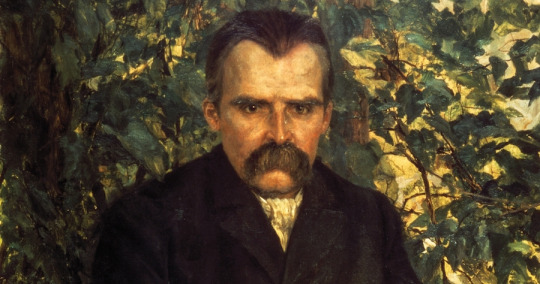
Having made the case for the impersonality of science (if not the self-abnegation of the scientist) in Scientific Self-Abnegation, it now remains to make the case for the uniquely personal, private, and idiosyncratic side of science—if indeed there is any such side of science, or if there is any such case to make.
What would an idiosyncratic scientific research program look like? It is not difficult to imagine, as for the greater part of the history of human science, scientific research programs were nothing more than the life work of a single man—an Archimedes, a Galileo, a Kepler, a Huygens, a Newton. This is the de facto condition of science in human history, but not necessarily the ideal of science, and not the reality of the large-scale research programs of big science that have come into being since the industrial revolution.
Scientific research programs in the time of Archimedes were the insights and ambitions of one man, but by the time of Newton there were printing presses, universities, scientific societies, and scientific journals (on which cf. Boundary Conditions of the Scientific Revolution). Newton had a community of scientific researchers to which he could communicate his work and from which he could anticipate an informed response. Even if Newton and his colleagues did not have the instantaneous global communications that we take for granted today, books did make their way around the world, and some scientists were well-traveled and worldly men in Newton’s day. And this was true to a much greater extent than was the case for Archimedes in classical antiquity.
Archimedes was a man a Syracuse, and his fate was tied to the fate of his city-state. The greatest institutions of learning of which we know from the pre-modern world—Plato’s Academy, the library at Alexandria, and the House of Wisdom in Baghdad—could be said to be regional centers of learning, or even centers on a civilizational scale that attracted the best minds within that civilization, but it is nothing like the international scientific collaboration of today.
Kenneth Clark made an astute observation related to this:
“The great churchmen of the eleventh and twelfth centuries came from all over Europe. Anselm came from Aosta, via Normandy, to be Archbishop of Canterbury; Lanfranc had made the same journey, starting from Pavia. The list could be extended to almost every great teacher of the early Middle Ages. It couldn’t happen in the Church, or politics, today: one can’t imagine two consecutive archbishops of Canterbury being Italian. But it could happen—does happen—in the field of science; which shows that where some way of thought or human activity is really vital to us, internationalism is accepted unhesitatingly.” (Civilisation: A Personal View, Harper & Row, 1969, p. 35)
Clark is right to point out that the church was an international institution (regionally confined to Europe) in the Middle Ages, and similarly the Roman world had its international institutions in the Mediterranean Basin in its time (though the use of “international” here is misleading and unhistorical). However, these earlier international institutions did not involve science, and despite their internationalism they were confined within a geographical region.
Science today thrives on a planetary scale, and so its institutions are planetary-scale institutions. But science began as a regional institution within Europe—this was science during the scientific revolution, from Copernicus to the industrial revolution—and before science was a regional institution, it was only the institution of gifted individuals and their immediate circle, if indeed a gifted individual had any circle at all. Many did not.
Previously I wrote about Nietzsche’s secret garden in Philosophies of the Secret Garden, in which I quoted the following:
“…out of my answers there grew new questions, inquiries, conjectures, probabilities—until at length I had a country of my own, a soil of my own, an entire discrete, thriving, flourishing world, like a secret garden the existence of which no one suspected. —Oh how fortunate we are, we men of knowledge, provided only that we know now to keep silent long enough!” (Nietzsche, On the Genealogy of Morals, translated by Walter Kaufmann, Preface, section 3)
I strongly identify with this. I have been working on my philosophical ideas in isolation for so many years that I have layers upon layers of concepts that are my own, so that concepts that I worked out several years ago I have since used to work out additional concepts that presuppose these earlier concepts. I have iterated this process to several generations with my own ideas, and this makes it extraordinarily difficult to explain what I am doing to others. Any explanation would make use of concepts that would have to be explained in turn.
It often happens that the bulk of a philosopher’s most original thoughts are to be found in their manuscripts. Probably every philosopher experiences what I have noted just above, and so holds back the strangest and least familiar flowers from his secret garden, instead presenting the public with only those arrangements that appear sufficiently conventional that they will not be rejected tout court.
Husserl wrote tens of thousands of pages in Gabelsberger shorthand, and Husserl’s industrious intellectual heirs have continued to transcribe, to edit, to publish, and to translate this enormous body of work almost a hundred years after this death. Godel’s notebooks, also written in Gabelsberger, are only now beginning to be transcribed and published (though they are already available in digitized form to anyone who can puzzle them out). I previously discussed these efforts in The arc of cognitive astrobiology is long, but it bends toward rationality. The impact of these philosophical efforts—the secret gardens of Husserl and Godel—will only be felt by the wider intellectual community in the coming century.
While philosophy in our time has started to follow the scientific model of international collaborative research, it is far behind science in this respect, and most philosophers doing truly original work do so in relative isolation, much as science was done in classical antiquity (though I might well argue that philosophy was an international collaboration in the ancient world, along the model that Clark described in the passage quoted above).
This is significant for science, because new scientific disciplines are suggested by novel philosophical research, and a new discipline in its nascent state is a fragile thing, easy destroyed if mishandled. It would be entirely understandable if a contemporary philosopher chose to work on ideas at the border of science and philosophy and kept this entirely to himself because this work would not likely be welcomed in either in the scientific community (being too philosophical) or in the philosophical community (being too scientific). Nevertheless, this is where most of the interesting ideas come from, and we tacitly and implicit rely on such efforts for the overall advancement of science.
I have often said that one of the advantages of the heightened individualism of western civilization is that it allows societies so organized to explore more possibilities at a lower social cost. Collectivist societies that insist upon joint social effort explore new possibilities at a high social cost, and failure can be catastrophic. This makes collectivist societies more risk averse than individualistic societies.
Additionally, the individualism of western civilization allows for the indulgence of eccentrics and splendid individuals, who, if they are successful, will be celebrated as individuals. And they may even be financially rewarded as individuals for their individual effort. Thus there is both a carrot and a stick for the individual researcher who attempts to make a contribution without being part of any wider research community.
The paradigm of “big science” represents a mainstreaming of a particular research program—a program that defines the wider research community—which enjoys disproportionately large social investments: university facilities, funding, personnel, equipment, etc. This has been crucial for the growth of what Kuhn called “normal science,” which is an enormous cooperative and collaborative effort. And with the conceptual framework of normal science being more comprehensive and more adequate than ever before in the past, normal science practiced as big science can continue almost indefinitely.
This potentially indefinite growth of normal science has been further facilitated by an awareness of Kuhnian philosophy of science, and this has meant that scientists are more clearly aware than at any previous time of the ellipses incorporated into the body of scientific knowledge, and many are open to considering alternative theories as long as those theories are competently expressed in the technical jargon of the discipline. We know that general relativity and quantum theory cannot be brought together in our current physics framework, and we know that we cannot explain large-scale cosmology (which often invokes “dark matter” and “dark energy,” which are merely ciphers that mean, “something to explain gravitational anomalies” and “something to explain the accelerating expansion of the universe”), so that the scientific community is actively seeking more adequate formulations of these problems.
Be that as it may, the most striking developments of science are likely to come out of the work of philosophical scientists (as indeed the theories of relativity and gravitation came out of Einstein’s work, and Einstein has rightly been called a “philosopher-scientist”), and these philosophical scientists will probably develop the most crucial and distinctive concepts that later serve to advance science in a Nietzschean secret garden of their own.
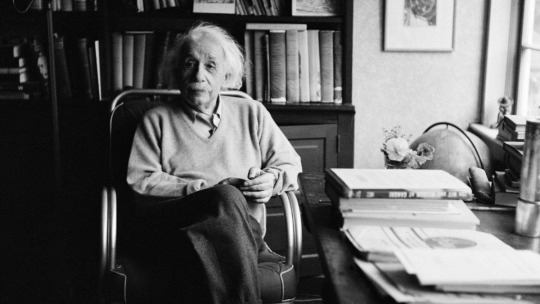
#Nietzsche#Friedrich Nietzsche#Kenneth Clark#science#history of science#scientific research program#individualism
0 notes
Text
Bruce Springsteen: Born to Run (an autobiography)
This is going to be more exorcism than exegesis – this book is odd, and I can’t stop thinking about why. The review line here is that this recent Springsteen autobiography is worthwhile enough if you are somewhere north of a casual Springsteen fan but if you are looking for a single Springsteen historical document, you’d be better served with the Dave Marsh biographies. Superfans will of course love it, the curious will find it entertaining if they wind up with a copy, and the odd people like me who are obsessives without being real superfans will, well, find it peculiar but involving.
Bona fides: I’m an obsessive in that I’ve listened to every Springsteen song, legally released or leaked, up to 2006-ish, have read many of related books, filtered through ephemera, had the concert experience numerous times at different stages of his carrier, and have intermittent year long bouts of compulsively listening/getting moved/thinking about the whole Springsteen enchilada. What really attracted me to him as an artist was that, unlike chameleons such as (Bruce fan) Bowie who committed to one thing at a time, he seemed to carry a bunch of different influences simultaneously, the skills of which he was proficient in, and would combine and project them - the arena rawker, the street party leader, the acoustic poet, the rock and roll revivalist, the RnB review, the storyteller, the piano balladeer - often capturing several in the space of a song. He also had such great phenomenological and artist-as-story interest: I had seen this with Elvis, but this was more complicated and comprised the sum of on stage relationships, story content, song preoccupations, personal life leaks, and attitude towards fans coalescing into a legend of an avatar of the American working class and underclass, coming in with a bunch of buddies who together were a family, to redeem something in the American spirit, all on the shoulders of some incredible will and discipline.
So why am I exiled like Moses, able to see the super fan promised land but never enter? First (and this is not restricted to Springsteen) I find the fan ethos offputting. It combines a deification I loathe with a fake chumminess that makes me nauseated. More importantly, though, I really don’t like much he has produced since Tunnel of Love marked his most significant career transition. I note only one great song (“Terry’s Song”) written since the Chimes of Freedom EP which marked the end of the ToL tour, his first marriage, and the initial E Street Band run. This includes a take it or leave it attitude towards current concerts on my part (the spark isn’t there for me) and wariness about where the Springsteen “story” has gone. One of the greatest things about him early on was the mastery of basically every corner of rock and roll, and his attempt to incorporate new elements and stay fresh are kind of embarrassing (I like Rage Against the Machine too, but the weak link there is Tom Morello’s guitar, and Springsteen hired him to “rejuvenate his sound”. Ugh).
So, why is it weird? I don’t read many autobiographies (only one I can remember finishing is No Blacks, No Dogs, No Irish) so maybe it’s par for the course, but this isn’t a sculpted recounting of history but a chain of 80 or so “stories” like extended versions of the ones he would tell on stage, and are concerned more with internal rhythm than an external sense of pace or continuity. There is a lot of backtracking where the reader needs to “match” events. This story approach extends to frequent use of his stage voice(s), where he will go into revival preacher or beat poet mode, do stream of consciousness riffs, and recount back and forth embellished dialogue (without quotes, but with interjections like ‘Marone!’) like he is arguing with himself. The good news is you can truly hear his voice in the semi-poetic prose. The bad news is it doesn’t flow well, leaves strange things out, cuts back and forth, and the story seems incomplete.
The best thing about the book is an authentic third angle on the Springsteen legend that I legit had never heard before. The Springsteen myth is heavily curated by the Boss himself and has always painted a picture, as I noted above, of a rock’n’roll family bringing a fun redemption to the world. This had to be resolved with journalistic and tabloid information that challenged the story, but there was always a fan synthesis that incorporated the info and left the godhead intact. My memory of rec.arts.music.springsteen (one such recounting was called “a good man,” gagh!) is that Juliana Philips was seen as “a mistake of exposure to big success” and “a vain actress,” and he soon realized that what he needed was a good Jersey girl (which resolves how the marriage never fit fan image of him and sands the edges off of the inconvenient timing of the affair). Springsteen’s recounting of this is a good example of the value of his non-filtered point of view. He goes out of his way to demonstrate the small town authenticity of Phillips and describe her as wonderful and loving. The problem was that he was impossible to get along with for anyone after a couple of years and his mishandling of the separation (not wanting the press to know while he began another relationship and got caught) is the biggest regret of his life (because of how it impacted his then-wife).
This approach reveals him as a hard guy to know. He describes himself as a narcissist and self-hater (cue Venn diagram of the overlap of narcissism and self-doubt being Art), and he tells story after story of the men in his life where he lengthily but gently drags them through the mud, then says “but we would die for each other and I love him.” These stories come off as whatever happens to passive aggressiveness after expensive therapy (and this book is therapy-speak rich), and often serves to make him look worse than outside data does (the Mike Appel story especially where Springsteen was utterly in the right and was maliciously kept from recording for several years, but here Springsteen does everything to make excuses for him, gives him a butload of credit, and still manages to come off a little petty, i.e. these stories tend to backfire). He spends a lot of time recounting how he told the bandmembers that they just had to understand that he needed all the control and that he had all the power, so they needed to suck it up.
The upbringing stuff is probably the best material and the most untrod ground. His family history is pretty compelling and I finally understand how his religious and ethnic background shaped his personality. The sex stuff makes him look idiosyncratic and selfish: a monk sometimes, do anything that moves one year, but usually a serial monogamist with uncondoned cheating. He comes off like a terrible boyfriend and worse husband (lots of lost weekend stuff), but this doesn’t really capture how odd the sex stuff is as much as that one passage about he and his dad went to Tijuana and he came back with the crabs. He mentions prostitutes more times than he mentions groupies.
He picks several concerts to elevate to most important status that are not big ones in Springsteeen lore, but have some kind of multicultural underpinning. To at least some extent, this is to craft a version of a guy who is in touch with human experience. He spends so much time on post Katrina, 9-11, and his hurt at the cops rejecting him after what he thought was the evenhanded “American Skin (41 Shots)” (the fact that he was surprised surprises me). His talk about race and Clarence Clemons is fascinating – their relationship was molded on stage because he thought it was an important one to America both as an example and as an aesthetic statement. They only knew each other in this context and rarely ever saw each other outside of stage and studio. So their friendship, such as it was, was a Springsteen story performed into existence. He is very conscious of (and calculated about) his cultural legacy.
So much is left out, yet there are a lot of stories that are barely OK, but seem there specifically to mark time so that it’s not Born in the USA cut-to everybody starts dying (thinking of the horse riding stuff as an example). His discussion of his depression is very valuable, but asynchronously told and thus hard to follow. The book is full of “aw shucks” enthusiasm, idiom, and showmanship, but is somehow unexpectedly unguarded about the inner workings of his mind. He comes off as someone driven and not comfortable in his own skin unless he is accomplishing something, but in a human, actually painful way, that I have only ever seen divulged by a celebrity once before (David Foster Wallace). I had an idea of Springsteen as reasonably well adjusted, but after this if he commits suicide I would not be surprised.
In the end, the book crystalizes in a new set for meanings of that old story of him ripping down the posters saying “the future of rock and roll” at the Hammersmith Odeon in London, 1975 – Springsteen is a control freak, most of all about what people think of him, crippled by self-doubt, with the constant need do something, anything, to reassert mastery over his art, his message, and his mind. That this is at odds with the book’s willingness to go deep and spill stuff he would usually keep close and it is this tension (along with its storyteller-quilted nature) gives it its strange charge. In the end, there is a grandiose humility that keeps it together and I’m glad I read it.
4 notes
·
View notes
Link
PARIS—Europeans woke to the news Thursday that U.S. President Donald Trump has banned most of them from traveling to the United States for at least a month. And while some of the details seemed to be confusing and contradictory, there was no mistaking his administration’s effort to blame their governments, and the European Union specifically, for the growing novel coronavirus crisis in the United States.The pandemic is “not limited to any continent and it requires cooperation rather than unilateral action,” said a European Union statement on Thursday morning. Directly contradicting Trump’s assertion that his administration has been “in frequent contact with our allies,” they said the EU “disapproves of the fact that the U.S. decision to impose a travel ban was taken unilaterally and without consultation.”In the meantime, media all over the Continent picked up on a line in testimony before Congress on Wednesday by Robert Redfield, director of the Centers for Disease Control and Prevention. “Europe,” he said, “is the new China.”Many commentators saw Trump’s action as overtly political, punishing the EU, which he has criticized frequently, while exempting the post-Brexit United Kingdom from the travel ban.Embattled Trump Blames Europe for Coronavirus in the U.S., Bans Travel“Trump needed a narrative to exonerate his administration from any responsibility in the crisis,” the former French ambassador to Washington, Gérard Araud, wrote on Twitter. “The foreigner is always a good scapegoat.” Since Trump had already blamed the Chinese, now it was the Europeans’ turn and not any Europeans, but those of the EU. “Doesn’t make sense but ideologically healthy,” at least from Trump’s point of view.Commentary in the German newspaper Sueddeutsche Zeitung was even more acerbic. Trump's address was "a speech that leaves you speechless," wrote its New York correspondent. Trump "talks about the virus the way he talks about illegal immigrants. And he has only one recipe for that: sealing borders, building walls."If Trump is looking for kudos from Great Britain for its exemption from his travel ban, he may be disappointed. Chancellor Rishi Sunak was asked Thursday morning about the travel ban. “We haven’t believed that that’s the right thing to do, the evidence here doesn’t support that," he said. "What we are trying to do is contain the virus while recognizing that it is now likely that it will spread more significantly.”While Trump has been widely criticized for his administration’s handling of the pandemic looming on the American horizon, he has been praised for his relatively early decision to suspend travel from China and Iran. In his remarks from the Oval Office on Wednesday evening, he said, “The European Union failed to take the same precautions and restrict travel from China and other hot spots,” which is true. “As a result,” Trump said, “a large number of new clusters in the United States were seeded by travelers from Europe.” In fact, as Trump’s own experts have testified, one of the biggest problems containing the spread of what Trump called “a foreign virus” in the U.S. has been the inability to identify the original source in any given group of infections.Trump Supporters Fuel Dangerous ‘Election Year’ Coronavirus ClaimAccording to World Health Organization numbers as of Wednesday, China—where the disease now known as COVID-19 was first diagnosed in December—has counted 80,955 infections and 3,162 deaths. In Europe the situation is indeed serious, but not yet that serious. Italy has been hit very hard, with more than 10,000 confirmed cases and 631 deaths as of Wednesday, and Rome has taken extreme measures, effectively locking down the entire country to try to contain the spread of the disease. Great Britain has 373 confirmed cases.The U.S. up to Wednesday had recorded 696 confirmed infections, but testing has been so poorly handled and so limited that the number is considered highly unreliable. As testing improves, the figure is expected to increase dramatically.France, Spain and Germany each have between 1,000 and 2,000 confirmed cases, while the rest of the countries in what the World Health Organization calls “The European Region,” have fewer than 500, in most instances far fewer. But they are lumped together as part of what is called the Schengen Area, which includes 26 countries where travel is allowed without any border controls. A week ago, Vice President Mike Pence was pointing this out—“The nature of the European Union is one doesn’t require a passport to move around”— signaling the administration’s consideration of the action taken by Trump on Wednesday night. REPORTS FROM THE FIELDWhile the EU does appear to have been scapegoated by Trump, it is also true that its several states have not been able to develop a single coherent and effective approach to the coronavirus threat, and the situations are dramatically different in different countries with different cultures, even as the infection spreads. In Germany (1,296 infections, 2 deaths), Chancellor Angela Merkel warned this week that as much as 70 percent of the population could be infected, and the government reportedly is experimenting with a system of drive-thru tests, enabling people to be screened for coronavirus without ever getting out of their cars.President Emmanuel Macron warned last week that in France (1,774 cases, 33 deaths) the epidemic is “inevitable,” and a series of measures have been taken to try to contain the spread, stopping short of full lockdowns. He is due to make a major address to the nation on Thursday night. Meanwhile the impact on tourism in the world’s most visited country and its capital, Paris, already is being felt. The Louvre Museum in Paris, for instance, was closed down briefly last week by concerned staff. It is now open but often virtually empty. Overnight many American tourists were scrambling to book flights back to the United States.Daily Beast correspondent Dana Kennedy reports from the Riviera that most of the people she’s talked to refuse to take the coronavirus threat seriously, including her doctor when she saw him earlier this week. “He was wearing a mask and had an office full of patients,” Kennedy writes. “He said he had yet to see one patient with the coronavirus. My doctor is a solid, intelligent guy I've known for 10 years. ‘We're being manipulated by the media and who knows what else,’ he said.”The Netherlands (382 cases, 4 deaths) has been criticized for what some critics see as too cool a response, says correspondent Nadette De Visser. The basic approach considers that the disease cannot be prevented, but may be managed. The head of the public health institute RIVM, Jaap van Dissel, is quoted Thursday in the Dutch daily De Volkskrant explaining that the Dutch policy aims to make sure the Dutch health services can handle the influx of patients. The idea is to “make it as hard as possible for the virus. Not by putting a fire hose on it and asking for applause,” van Dissell said, “but rather by putting a damper on as many little fires as possible, so the fire can be extinguished. Isolate cases. Avoid transmission. Trace new cases quickly. All this in an effort to prevent the accumulation of sick people that could cause the health care system to be disrupted." In Spain (1,639 cases, 36 deaths), Itxu Díaz reports, one member of the cabinet, Equality Minister Irene Montero, has tested positive for coronavirus and her husband has been quarantined. Both attended the huge International Women's Day march on Sunday, as did the rest of the cabinet, raising the question how many other members of the government might be infected.The situation in Spain is so serious, Díaz writes, that many people are saying they think Trump’s travel ban makes sense, “despite the fact most Spaniards detest him.” The Madrid regional government reportedly has been begging the government for 10 days to take drastic measures, but the government continued through Sunday, the day of the march, telling Spaniards that this was "a flu" and that no extraordinary measures were necessary.Schools and universities have been shut down but, as in other countries, students appear to see this as a holiday. “Last night the bars and terraces of Madrid were full of students celebrating the suspension of classes,” writes Díaz. Office workers are leaving the capital to “tele-commute” from their home towns in Galicia, Valencia, Andalusia, and in many cases probably taking the virus with them. “The example of Italy has been useless,” says Díaz.In Rome, the capital of an entire nation on lockdown, Correspondent-at-Large Barbie Latza Nadeau has been tracking disaster hour by hour.“This city is in a state of shock after harsher restrictions were laid down last night,” she wrote on Thursday morning. “The [Trump] travel ban for us has been in effect (though not official) for quite some time.”“I sense a feeling of relief that we may see the end of this dark tunnel though,” Nadeau wrote. “I think when you are in the middle of the worst of the pandemic outside of China (we are at 12,462 cases and 827 deaths according to the latest Italian government numbers) you sort of welcome someone trying to stop it.“I do think Italy failed initially on its handling of the lockdown and I am sure they would also agree that the spread is almost entirely a result of mishandling of the first few cases, not believing that ‘patient one’ could have it because he hadn’t traveled. Denial is deadly in cases like this.“On one hand, and this is from a ground zero perspective, the situation feels less hopeless now that the restrictions are tighter than it did a few days ago when it seemed out of control,” Nadeau wrote. “We were also told last night the numbers here might peak in another week, meaning we could easily hit 50,000 infections in Italy. The effect of the lockdown won’t be seen for at least two weeks. If it failed? God only knows.”Read more at The Daily Beast.Get our top stories in your inbox every day. Sign up now!Daily Beast Membership: Beast Inside goes deeper on the stories that matter to you. Learn more.
from Yahoo News - Latest News & Headlines https://ift.tt/38Jdl7a
0 notes